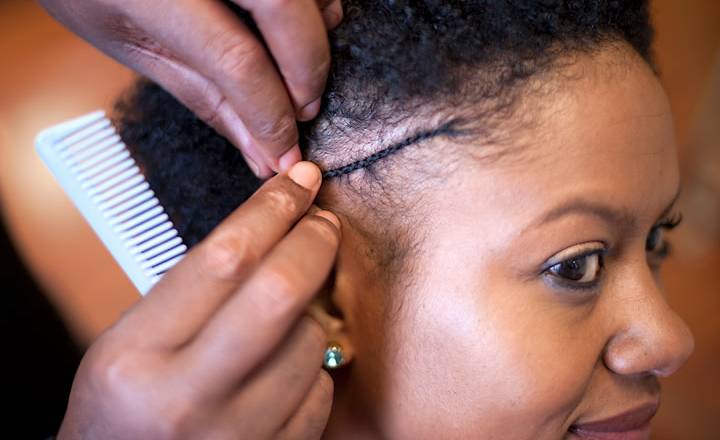 The image above comes from a 2021 training module for pigmentation and scalp disorders on darker skin. A sign of change in emphasis, which is welcome and needed.
The image above comes from a 2021 training module for pigmentation and scalp disorders on darker skin. A sign of change in emphasis, which is welcome and needed.
In a scientific sense, everyone’s skin is similar but there are differences. Medical conditions can be unique to darker skin, or show in a different way, redness can be harder to see, inflammation less obvious.
For the field of dermatology, where memorising visual signs is so important to the ability to diagnose accurately, differences need to be understood. There should also be sound awareness amongst general medical staff.
We know from levels of inaccurate diagnosis and surveys of staff in a variety of posts that a prime issue is training. To date, the core of dermatological training has been based on fairer skin types.
Recent Research
A 2020 review looked at 130 publications relating to manifestations of Covid-19 on the skin, including Covid toe and a range of rashes.
92% of the images shown were were for fair skin types, with no images for very dark skin. A similar study of associated text found that descriptions were again predominantly of conditions as seen on fair skin.
Surveys of doctors show equal concerns, that their eyes are not trained to diagnose conditions on darker skin. With the non white population of the UK projected to exceed 20% within a generation, they need to be.
The risk extends beyond common skin conditions, with skin cancer also found to be less accurately diagnosed, due to pigmentation differences in lesions, or their location. Diagnosis can also come at a later, harder to cure stage.
Closing The Gap
There is currently no formal requirement in UK dermatology curricula to cover differences created by skin colour. A study of dermatology trainees found that less than 25% had received specific teaching related to ethnic skin.
Change is however coming, with the first syllabus for treating ethnic skin now written. This will become a fixed aspect of UK dermatology specialist registrar training, as laid out by the British Association of Dermatologists.
Further work is ongoing to integrate similar knowledge into a wide range of learning resources. A skin diversity committee has been formed by the BAD, to ensure understanding is shared across the dermatology profession.
Dermatologists and other medical staff are pleased with this, they want to be entirely competent in treating all the patients they see.
The Current Position
We do not wish to over emphasise the issue, misdiagnosis is possible on any skin colour and in most cases, people of all skin colours will receive good care. Nevertheless, more than half of dermatologists feel they would be less competent when treating ethnic skin.
The ability to recognise subtle changes on dark skin matters, accrued through a mix of dedicated training and experience. Even more crucial during the coronavirus pandemic, with increased use of teledermatology.
Sound knowledge of dermatology for darker skin needs to be more widely spread to serve our population. Awareness of this need is thankfully increasing.
